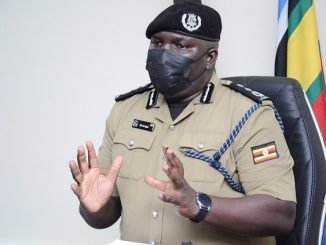
Kampala, Uganda | By Michael Wandati | In a recent report released by the Uganda Human Rights Commission (UHRC), it has been disclosed that many junior police officers in Uganda face challenges in starting families due to the shared and dilapidated living conditions they endure.
The report, titled “Squeezing water out of a stone? Working and living conditions of the Uganda Police Force personnel and their implications on observance of human rights,” sheds light on the substandard housing conditions experienced by lower-ranking police officers, who often reside in inadequate units partitioned by curtains.
Presenting the report to Deputy Speaker of Parliament Mr. Thomas Tayebwa, Ms. Mariam Wangadya, the Chairperson of the Uganda Human Rights Commission (UHRC), emphasized the urgent need to improve the welfare of police officers.

Ms. Wangadya stated, “The situation of housing or accommodation in the police force was dire with institutional accommodation largely dilapidated, comprising shared rooms partitioned by either curtains or make-shift boards. Some of them told us that it was hard for them to get children because of these situations. They reside in condemned structures and uniports which are unfit for human habitation.”

Also Read: Police living conditions worsen, Tayebwa calls for improved support
The report also highlighted dissatisfaction among 70 percent of police officers regarding deployments, transfers, and promotions. Factors contributing to this discontent include corruption, favoritism, tribalism, nepotism, and a lack of technical know-how.
Deputy Speaker Tayebwa acknowledged these findings, expressing that some of the issues raised will be taken into consideration during the ongoing 2024/2025 budget process. The acknowledgment signals a potential effort to address and improve the working and living conditions of junior police officers in Uganda.
“Police put up an advert, I have received over 100 calls, help me I join Police. Is there another driving factor, is it corruption, are they finding a way of mitigating the situation. It is something we should interest ourselves as a Government and just don’t say these guys are doing a great job, they are comfortable and we take it for granted,“ Tayebwa said.

“It is something we should interest ourselves as government. I hope we can dig deeper since the Human Rights Commission has given us a foundation in its research,” remarked Tayebwa.
In addition to concerns about working conditions, Mr. Tayebwa criticized the allocated budget ceiling of Shs 841 billion for the police force. He highlighted the substantial shortfall compared to the proposed budget of Shs 3.2 trillion, emphasizing that this funding gap leaves many crucial needs unmet. He urged a reconsideration of the budget allocation to better support the police force.

As discussions unfold, the Deputy Speaker’s call for improved support and a thorough investigation into the challenging conditions faced by police officers resonates.
This emphasizes the importance of addressing these issues for the overall well-being of law enforcement personnel and ensuring the effective maintenance of law and order in the country.



